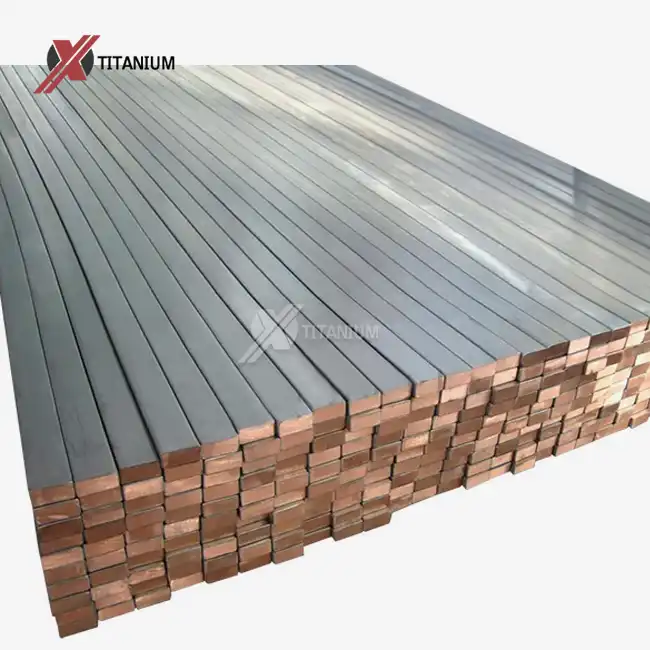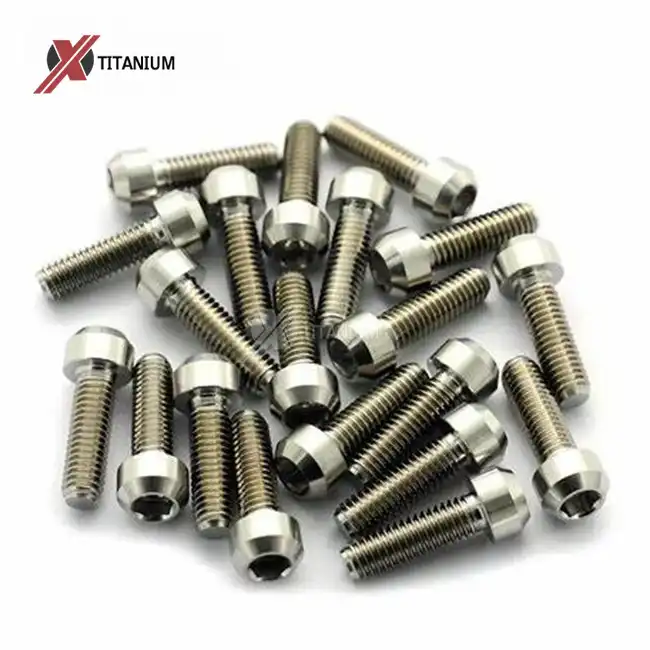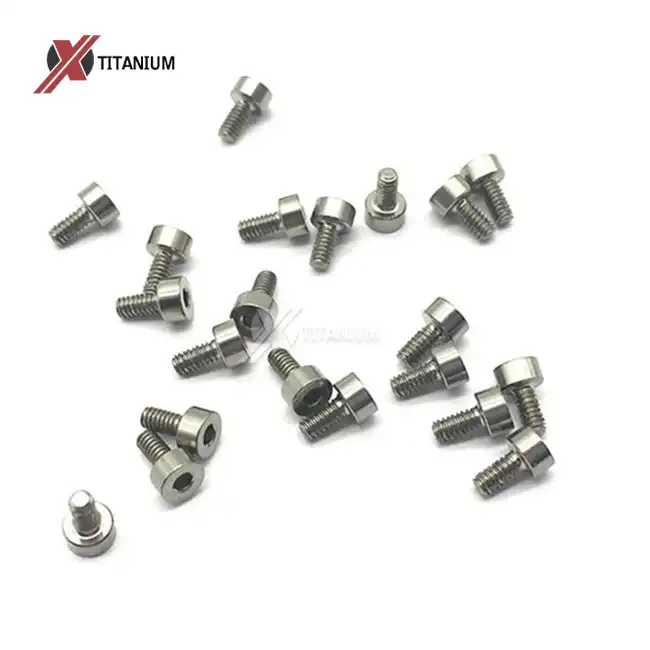The Anatomy and Function of Gr5 Titanium Banjo Bolts
Components and Design Features
Gr5 Titanium Banjo Bolts are precision-engineered fasteners that play a vital role in hydraulic systems, particularly in high-performance motorcycles and racing vehicles. These bolts are crafted from Ti-6Al-4V alloy, also known as Grade 5 titanium, which offers an exceptional balance of strength, lightweight properties, and corrosion resistance. The bolt consists of a hollow shaft with a threaded exterior and a distinctive banjo-shaped head featuring side ports for fluid passage.
The head of a Gr5 Titanium Banjo Bolt is designed with a flared, circular shape that houses internal channels. These channels allow hydraulic fluid to flow through the bolt while maintaining a secure connection between components. The side ports in the head align with the hollow center of the bolt, creating a pathway for fluid transfer. This ingenious design ensures efficient fluid circulation without compromising the structural integrity of the connection.
Material Properties and Advantages
The use of Grade 5 titanium in banjo bolts offers numerous advantages over traditional materials like steel or aluminum. Ti-6Al-4V alloy boasts an impressive strength-to-weight ratio, making it ideal for applications where weight reduction is critical without sacrificing durability. This alloy exhibits excellent fatigue resistance, ensuring long-term performance under cyclic loading conditions common in brake and clutch systems.
Gr5 Titanium Banjo Bolts also benefit from titanium's inherent corrosion resistance. Unlike steel fasteners that may rust or corrode when exposed to harsh environments or brake fluids, titanium bolts maintain their integrity and appearance over time. This resistance to corrosion not only enhances the longevity of the component but also ensures consistent performance throughout its lifespan.
Application in Hydraulic Systems
In motorcycle and automotive applications, Gr5 Titanium Banjo Bolts are primarily used in brake and clutch systems. They serve as critical connection points between hydraulic lines and components such as master cylinders, calipers, and clutch assemblies. The hollow design of these bolts allows brake fluid or clutch fluid to flow seamlessly through the system while maintaining a secure, leak-free connection.
The use of titanium in these applications offers several benefits. The reduced weight of titanium bolts contributes to overall vehicle weight reduction, which can improve performance and fuel efficiency. Additionally, the superior strength of Grade 5 titanium ensures that the bolts can withstand the high pressures and temperatures encountered in high-performance braking systems without deformation or failure.
Manufacturing Process and Quality Control
CNC Machining and Precision Engineering
The production of Gr5 Titanium Banjo Bolts involves a sophisticated manufacturing process that relies heavily on computer numerical control (CNC) machining. This advanced technology allows for precise control over the cutting and shaping of titanium alloy, ensuring that each bolt meets exacting specifications. The CNC process begins with titanium bar stock, which is carefully selected to meet the required material standards.
During machining, the titanium undergoes multiple operations to create the bolt's complex geometry. This includes turning the external thread, drilling the central bore, and milling the banjo-shaped head with its fluid channels. The precision of CNC machining is crucial in maintaining tight tolerances, particularly for the fluid passages and sealing surfaces that are essential for proper hydraulic function.
Surface Treatments and Finishes
After machining, Gr5 Titanium Banjo Bolts often undergo various surface treatments to enhance their performance and aesthetic appeal. One common treatment is anodizing, an electrochemical process that creates a protective oxide layer on the titanium surface. This layer not only improves corrosion resistance but also allows for the creation of vibrant colors such as gold, blue, purple, or black.
Some manufacturers offer additional surface treatments like nitriding, which can further improve the bolt's wear resistance and surface hardness. Polishing is another finishing step that can be applied to achieve a smooth, reflective surface. These treatments not only enhance the bolt's functionality but also allow for customization to match the aesthetic preferences of motorcycle enthusiasts and racers.
Quality Assurance and Testing
Ensuring the reliability and performance of Gr5 Titanium Banjo Bolts requires rigorous quality control measures. Manufacturers implement comprehensive testing protocols to verify that each bolt meets or exceeds industry standards. These tests may include dimensional checks, material composition analysis, and mechanical property evaluations.
Tensile strength testing is particularly important, as it verifies that the bolts can withstand the high stresses encountered in hydraulic systems. Manufacturers typically aim for a minimum tensile strength of 950 MPa for Grade 5 titanium bolts. Additionally, pressure testing may be conducted to ensure the integrity of the fluid passages and sealing surfaces.
To guarantee traceability and compliance with international standards, reputable manufacturers provide material certifications and test reports. These documents may reference standards such as ASTM B348 for titanium alloy specifications or ISO 5832-3 for medical and industrial applications of titanium alloys.
Advantages and Considerations for Using Gr5 Titanium Banjo Bolts
Performance Benefits in Motorsports
The adoption of Gr5 Titanium Banjo Bolts in motorsports has become increasingly prevalent due to their numerous performance advantages. The most significant benefit is weight reduction, as titanium bolts are approximately 40% lighter than their steel counterparts. This weight savings, while seemingly small for individual components, can contribute to a noticeable reduction in overall vehicle weight when applied across multiple fasteners and parts.
In high-performance racing applications, every gram counts, and the cumulative effect of using titanium fasteners can lead to improved acceleration, handling, and fuel efficiency. Moreover, the superior strength of Grade 5 titanium ensures that these bolts can withstand the extreme forces and vibrations encountered in racing conditions without compromising safety or reliability.
Longevity and Maintenance Considerations
Gr5 Titanium Banjo Bolts offer exceptional durability and longevity compared to traditional fasteners. Their resistance to corrosion means they are less likely to seize or become difficult to remove during maintenance, a common issue with steel bolts exposed to harsh environments or corrosive fluids. This resistance to corrosion also helps maintain the integrity of the hydraulic system by preventing contamination from rust particles.
While the initial cost of titanium bolts is higher than that of steel or aluminum alternatives, their long-term value proposition is compelling. The extended lifespan and reduced need for replacement can offset the higher upfront investment, particularly in high-stakes racing environments where reliability is paramount. Additionally, the ease of maintenance associated with corrosion-resistant fasteners can lead to time and cost savings during routine service intervals.
Aesthetic and Customization Options
Beyond their functional benefits, Gr5 Titanium Banjo Bolts offer aesthetic advantages that appeal to motorcycle enthusiasts and custom builders. The natural titanium finish provides a sleek, modern appearance that complements high-end motorcycles and racing machines. Furthermore, the ability to anodize titanium in various colors allows for extensive customization options.
Anodized titanium bolts can be color-matched to other components or used as accent pieces to create a unique visual identity for a motorcycle. Popular color options include gold, blue, purple, and black, with some manufacturers offering multi-color or "rainbow" finishes. This level of customization enables riders and builders to achieve a cohesive and personalized look for their machines while benefiting from the performance advantages of titanium.
Conclusion
Gr5 Titanium Banjo Bolts represent a pinnacle of engineering in the world of high-performance fasteners. Their unique design, coupled with the exceptional properties of Grade 5 titanium, makes them an ideal choice for demanding applications in motorsports and beyond. While their cost may be higher than traditional alternatives, the benefits in terms of weight reduction, strength, corrosion resistance, and customization options make them a worthwhile investment for those seeking the ultimate in performance and aesthetics.
As the automotive and motorcycle industries continue to push the boundaries of performance and efficiency, components like Gr5 Titanium Banjo Bolts will play an increasingly important role. Their ability to withstand extreme conditions while contributing to overall vehicle optimization ensures their place in the future of high-performance engineering. For more information about Gr5 Titanium Banjo Bolts and other titanium products, please contact us at info@cltifastener.com or djy6580@aliyun.com.




